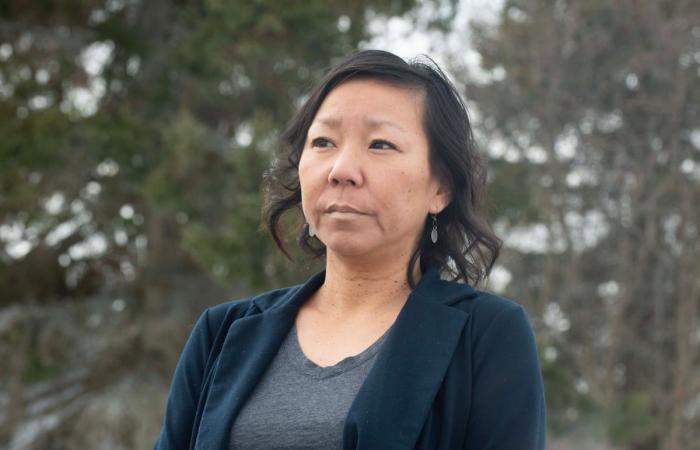This is the question that several resources for women in difficulty are asking themselves today, while a 49-year-old man from Bécancour, currently before the courts in a domestic violence case, recently had the anti-reconciliation bracelet removed. he wore. A condition discussed between the crown and the defense, who then agreed to give up pleading the Jordan ruling for unreasonable delays.
Both the crown and the defense, for their part, believe that there was never any attempt to “negotiate” the safety of the victim, and that the court acted appropriately based on case law and in the interest of sound administration of the matter. justice.
The case took place on October 21 at the Trois-Rivières courthouse. The man, whose identity I will not reveal to protect that of his ex-partner, was back in court on charges of armed assault, assault, sexual assault and threats against the complainant.
Accused in the summer of 2023, the man allegedly, shortly after, tried to communicate with the complainant, which was forbidden to him. He was therefore accused of breach of condition, and the court ordered the man to wear an anti-reconciliation bracelet. So he had been wearing it for a little over a year.
This is what a court-imposed anti-reconciliation device looks like. (Erick Labbé/Archives Le Soleil)
On October 21, given the evidence of a congestion of the court role and the possibility that the 18-month deadline imposed by the Jordan decision in this type of accusation would be invoked, discussions took place between the crown and the defense in order to have the bracelet removed, in exchange for which the defense agreed to waive delays until a trial date was set.
At least that's what we understand when listening to the exchanges that took place in court, a recording that was provided to me following a request to the criminal registry.
“Currently, the gentleman has an anti-reconciliation bracelet on his right ankle. What my colleague is offering me is to modify the conditions to remove the anti-reconciliation bracelet. […] In which case, my client is ready to waive the deadlines,” Me Alexandre Biron declared to the court.
The crown confirmed to Judge Geneviève Marchand that everything was in accordance with the discussions, indicating that the complainant had been “informed of the situation”.
I have not been able to contact the alleged victim to find out whether or not this was the case, and whether or not she had agreed to this measure.
Concerns
The affair did not fail to spark several organizations that work with women who are victims of domestic violence, as well as victims of sexual assault. For these resources, it becomes worrying to note that a measure put in place to ensure the safety of an alleged victim in a legal process becomes an “object of negotiation” to avoid the Jordan ruling.
“Can the constitutional right to a trial within a reasonable time justify compromises that undermine security measures for victims? This type of negotiation raises serious concerns, particularly in the context of violence against women where the safety of the victim should always be a priority,” declared Manon Monastesse, general director of the Fédération des shelters pour femmes du Québec. .
“Here we observe a dynamic where the judicial system seems to prioritize the logistics of delays to the detriment of the protection of the woman concerned. This is a first to our knowledge, and it sends a worrying signal for all victims.”
— Manon Monastesse, general director of the Federation of shelters for women of Quebec
No history
Reached by telephone, the accused's lawyer, Me Alexandre Biron, greatly qualifies these facts. The latter explains that the file had been the subject of discussions before October 21, and was not based solely on the Jordan judgment.
He specifies that basically, his client, presumed innocent until proven guilty, has no criminal record and would never have contravened his conditions since the imposition of the wearing of the anti-reconciliation bracelet, there is more than a year. The assault charges were also brought summarily.
Me Alexandre Biron. (Stéphane Lessard/Archives Le Nouvelliste)
“The Supreme Court is clear on this: the conditions imposed on defendants must be as least restrictive as possible, and must be re-evaluated throughout the judicial process. This is what was done here, and the prosecutor did his job very well, based on what the Supreme Court said.”
— Me Alexandre Biron, lawyer for the accused
“If my client had had several criminal records, the situation would have been completely different. But in the circumstances, the gentleman did not represent such a risk that he had to continue to wear the device,” adds Me Biron, who assures that since the removal of the bracelet, the man would not have attempted to make contact with the complainant.
The Director of Criminal and Penal Prosecutions is assured that the safety of victims continues to come first, and that at no time has the DPCP wished to send a negative message to women who decide to file a complaint.
With regard to the file in question, a congestion of the role occurred on October 21, so that the file had to be postponed to February 17, 2025, which would have exceeded the 18-month deadline.
“When there is congestion on the roll, the delays are attributable to the State. It should be noted that in the event that a stay of proceedings had been pronounced by the court for an infringement of the right to be tried within a reasonable time, the conditions protecting the victim would have all fallen, even before the trial took place. The defense has waived the deadlines and the other conditions of release remain in force in order to protect the victim in the case,” confirms Me Annabelle Sheppard, spokesperson for the DPCP.
“Any request for modification of condition made is evaluated according to the specific context of each case and with the greatest consideration for the victims. Throughout the proceedings, the prosecutor considers, in the decisions he makes, the victim's right to security and privacy.
— Me Annabelle Sheppard, spokesperson for the DPCP
Not reassuring
Nothing, however, to reassure organizations that work with women.
“This case reveals a worrying message for all women victims of violence who are hesitant to file a complaint: how can we have confidence in the system if protection measures are set aside for procedural considerations? By not allowing victims to be involved in these decisions that directly affect them, we reduce their role in the legal process and, by extension, diminish their sense of safety. This positioning goes against the primary objective of the specialized court to put, in principle, the victim at the center of the legal process,” adds Manon Monastesse.
At the Center for Assistance and Combating Sexual Assault (CALACS) in Trois-Rivières, we say we are just as outraged by the situation.

Marie-Soleil Desrosiers, speaker at CALACS in Trois-Rivières. (Sylvain Mayer/Archives Le Nouvelliste)
“I understand that any citizen who is indicted has rights in a country where the person is presumed innocent until proven guilty. In this case, if he has an anti-reconciliation bracelet, it is because the judge had reason to believe that he was potentially dangerous, even during the proceedings,” considers Marie-Soleil Desrosiers, speaker at CALACS of Trois-Rivières.
“The rights of those charged should not take precedence over the rights of victims.”
— Marie-Soleil Desrosiers, speaker at CALACS in Trois-Rivières
The latter has great hope in the establishment of courts specializing in sexual and domestic violence, one of which will be operational in the coming weeks, or even within a few months, in Trois-Rivières.
According to Ms. Desrosiers, the Jordan ruling, when applied in matters of sexual or domestic violence, creates a form of secondary victimization among victims, destroying their hopes of regaining their dignity and security, who only want a thing: breathe again.
“Victims who report criminal charges – which is rare – do so for good reasons, and they have thought about it for sometimes years, have invested their time, their energy, their mental health… to arrive at this: l “Jordan ruling”, laments Marie-Soleil Desrosiers.
What is the Jordan decision?
Handed down in 2016 by the Supreme Court of Canada, the Jordan decision sets the maximum time that can elapse between the indictment of a person and the holding of their trial. In the provincial court, the deadlines are set at 18 months. They increase to 30 months for higher courses.
The objective of the Jordan decision is to ensure that an accused obtains a trial within a reasonable time, thus avoiding lengthy trials that can last several years. The public prosecutor's office, failing to be able to respect these deadlines, often finds itself confronted with the defense invoking the Jordan ruling in order to ensure that the rights of the accused are respected. A state of affairs which has led to significant pressure on the shoulders of the public prosecutor.
A year after this ruling was delivered, in 2017, it was estimated that a stay of proceedings had been ordered in more than 200 criminal cases in Canada.








